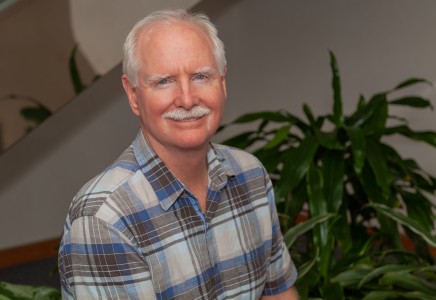May built a career in physics focused on health and safety
When Bob May was a student at Virginia Tech in the 1970’s, the school was in the early stages of developing a curriculum that would include environment, safety and health aspects of ionizing radiation for science majors. Now, as the ES&H deputy director at Jefferson Lab, May can look to a decades-long history of involvement and leadership in the field of health physics that began when he was a student at Tech helping to pilot the first courses in his field.
Health physics, according to the Health Physics Society, is a “profession devoted to protecting people and their environment from potential radiation hazards while making it possible to enjoy the beneficial uses of radiation.”
May has been a member of the Health Physics Society since his time as an undergraduate student member of the Virginia Chapter.
“When I was a third-year student in a 300-level biology course, there was a saying that the pay was better for laboratory rats than for biology students with an undergraduate degree,” May says.
“Then, as a fourth-year student, I saw a handwritten sign saying that if you want to make money when you graduate, come to this meeting in the nuclear engineering hall,” he recalls. “I went, and there were a few other students there, and we learned about a professor who was trying to resurrect a health physics specialty at Tech. He enlisted students, and we went around and lobbied professors to begin to teach the curriculum again. We got chemistry, engineering, nuclear physics and biology professors to begin teaching it again. I stayed an extra year to finish that curriculum.”
After graduating from Tech with a biology degree and a focus on health physics, May began his career as a radiological health specialist with the Commonwealth of Virginia State Health Department. From there, he moved to Norfolk and spent nearly a decade with the Department of Defense at Norfolk Naval Shipyard. Finally, May began working at the lab when it was the Continuous Electron Beam Accelerator Facility (CEBAF) as the acting head of the radiation control group—a career that has since evolved into his current role with the lab.
“The world has a bit of a skewed sense of risk assessment,” explains May. “You might think nothing of driving your car 37 miles one way to work and taking your life into your hands. Do that day-in and day-out for 30 years, and that’s a very risky activity in which you can’t control all the variables. With work activity around radiation, you can control the variables. You can manage the risk. Yet, people are more afraid of radiation than they are of driving their car, and it should be the other way around.”
He says that the Health Physics Society provides accurate information to the public about radiation. May is also a member of the American Academy of Health Physics, which offers membership to all individuals who have been granted certification in Comprehensive Health Physics by the American Board of Health Physics (ABHP).
Involvement with the Health Physics Society
It was during his fourth year as a student at Tech that May first got involved with the Health Physics Society and he has been a member for the four decades since.
“The society is a scientific organization of professionals who specialize in radiation safety,” May explains. “The mission is to promote excellence in the practice of radiation safety. I got involved when the Virginia chapter opened itself up for student members.”
Since his first year with the chapter, May has consistently taken leadership roles within the organization, serving across the board where needed, including as president, secretary, newsletter editor, parliamentarian and American Board of Health Physics Exam part two panel member. Currently, he serves as a plenary member of the national body, president-elect of the accelerator section, and treasurer of the Virginia Chapter.
In 2020, May was elected by his peers as a Fellow of the Health Physics Society.
In his announcement of the award, Nolan Hertel, chair of the awards committee, explained that the award is given to members of the Society in recognition of their significant administrative, educational and/or scientific contributions to the professional of health physics.
“It’s really heart-warming part that there are people I work with that value my contribution enough to recommend me to the committee as a fellow,” says May. “To get that kind of support from your peers is really quite something.”
Thanks to the increased attention to workplace health and safety, health physics programs have grown throughout the nation since May was an undergraduate. In 2003, May earned a master’s degree in health physics from the Illinois Institute of Technology.
Additionally, he earned a master’s degree in theology from Saint Leo University along with his wife, with whom he shares five adopted children.
“I have many conversations with people about the convergence of science and religion,” he says. “It’s a never-ending source of thought-provoking ideas.”


